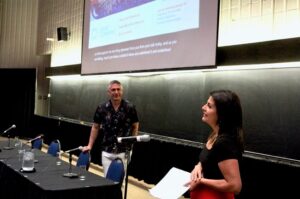Indigenous Peoples from around the globe come together at Lakehead University campus

By Rick Garrick
THUNDER BAY — Lakehead University’s C2UExpo 2023, held from June 5-8 at the Thunder Bay campus with about 350 participants from around the world, included a Kinoo-amaadawad Megwaa Doodamawad stream focused on Indigenous health determination and research.
“We’ve been able to put together sessions that are guided by Indigenous knowledge holders and Indigenous scholars for us to not only discuss but also engage in planning work around Indigenous self-determination and research,” says Lana Ray, associate professor in the Department of Indigenous Learning, Indigenous research chair in Decolonial Futures, and director of the Anishinaabe Kendaasiwin Institute at Lakehead University and Red Rock Indian Band citizen. “We had grandmothers who govern the Anishinaabe Kendaasiwin Institute, they shared a session on how we already have our own processes for Indigenous data governance. And tomorrow (June 8), we’re having a really great session where we have a delegation of Mayan people from the Yucatan Peninsula and they’ll be sharing their experience of asserting Indigenous self-determination over research in their community. They’ve worked collaboratively to put forth a set of guidelines that governs which researchers enter their community and their conduct.”
Ray moderated the opening Morning Keynote Plenary: Responsible Research and Innovation: The Challenge of Generating Impact with Indigenous Communities by Maui Hudson, associate professor at the University of Waikato, on June 6.
“Maui offers a wonderful perspective both as a scholar [and] a leadership position within his community, so he’s culturally and community grounded and he’s also worked in a number of different areas,” Ray says. “He’s worked in health, he works in bridging Indigenous knowledges and sciences and other areas, so he’s been instrumental in terms of the global movement, as well as locally in his territory around Indigenous data governance. A lot of the things we’ve been thinking about, dreaming about, they’ve actually put into practice in New Zealand so he came and he’s really shared a lot of that, and we’ve engaged in some wonderful conversations even after his session, a lot of ongoing conversations to start to think about what does that look like within our own distinct context.”
Ray also attended presentations on Navigating Colonial Spaces to Engage Indigenous Knowledges in the Advancement Social Work Education by Denise Baxter, vice provost of Indigenous Initiatives at Lakehead University, and Anita Vaillancourt, assistant professor in the School of Social Work at Lakehead University and member of the Anishinaabe Kendaasiwin Institute, and Engaging Remote First Nations in Treaty 5 and 9 in Indigenous Cumulative Effects (ICE) Research: Lessons Learned by Dan Duckert, director of Research, Treaties, Lands and Resources at Keewaytinook Okimakanak Tribal Council, on June 6.
“They held a circle in the morning that was helping us think about how do we actually Indigenize institutions in a good way and how do we do work that moves beyond maybe some of the beads and the feathers and actually is transformative in terms of how power and privilege operate within Western institutions and continue to hold up particular ways of knowing and being that aren’t our own,” Ray says.
Ray says it is always wonderful to meet with other Indigenous people from around the world at gatherings such as the C2UExpo 2023.
“When I gather with other Indigenous peoples internationally, there’s differences but fundamentally we talk so much about shared experiences, in two ways,” Ray says. “Starting with the positive first, like our shared experiences of just the strength and the brilliance that comes out of our own Indigenous knowledge systems, but then unfortunately also the shared experiences of colonialism and oppression as well.”

